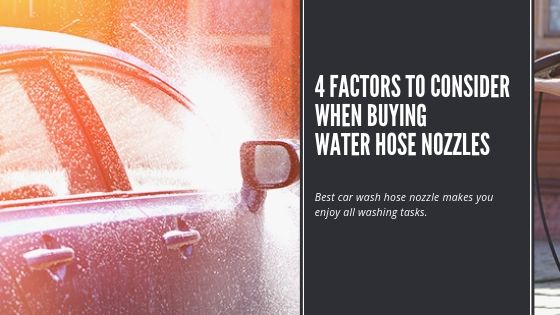Best car wash hose nozzle makes you enjoy all washing tasks.

Washing your car at home can help save a ton of money and can make for a pretty fun time for you and your family. That being said, there are a ton of different car wash hose nozzles on the market and it is important that you find the right nozzle for your needs.
What might seem to be the right features for some may not fit the needs of others and taking the time to consider what you want can mean the difference between a nozzle that works and one that you will ultimately need to replace.
When looking for the best water hose nozzle, you have to consider few aspects of what you need in a water hose nozzle. Some of the important things to research on before buying the hose nozzle include:
- Durability
The first thing to consider before buying a water hose nozzle for cleaning your car is durability and the overall build quality.
You have to check on the material used so that the nozzle will not jam or break down after using it for some time.
- The Number Of Moving Parts At The Nozzle
The number of moving parts at the nozzle is also an important aspect to consider before purchasing your water hose nozzle.
Since water hose nozzles are often wet and dropped, it is important that a hose nozzle should not start to corrode as well as start experiencing fast wear and tear.
- Ergonomics
Since washing your car or watering your garden can require you to hold your hose for a long period of time, the water hose nozzle should be easy to hold especially for those who do not have the strong grip.
- Functionality
Some of the things to consider in a water hose nozzle include ease of use, a locking mechanism, and the spray pattern.
Buying a water hose nozzle before checking on its functionality, you may end up disappointed at the end.
Buy The Best Water Hose Nozzle
Search for the best water hose nozzle for cleaning your car, try to use AquaHung car wash hose nozzle and you will enjoy all your washing tasks with no regrets.
AquaHung produces more than 1,000,000 garden hoses each year and exports them in the international horticultural market. Manufactured by premium material to guarantee the best quality of water garden hoses and also provide a short lead time, cost-effective for all shipments they made. If you have requirement of garden watering tools, please do not miss AquaHung.
AquaHung car wash hose nozzle that may just be what you need to get your car sparkling clean.
Article Source: Speed Final, PressureWasherToday.com
